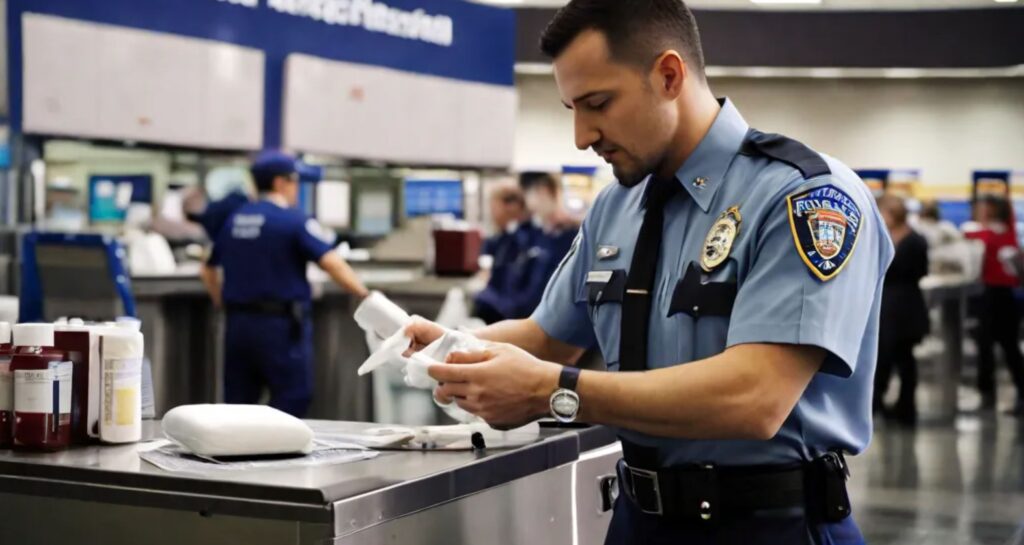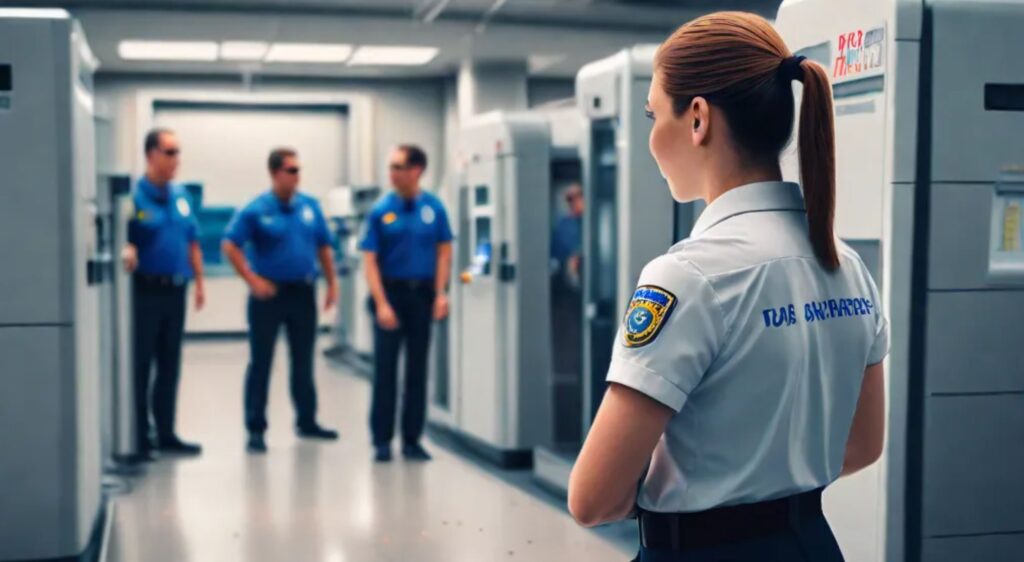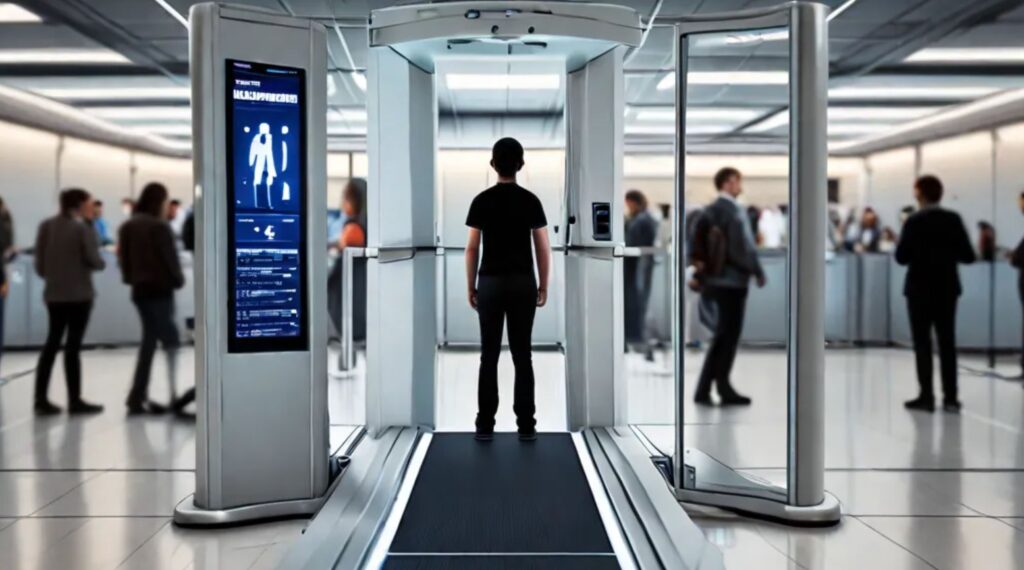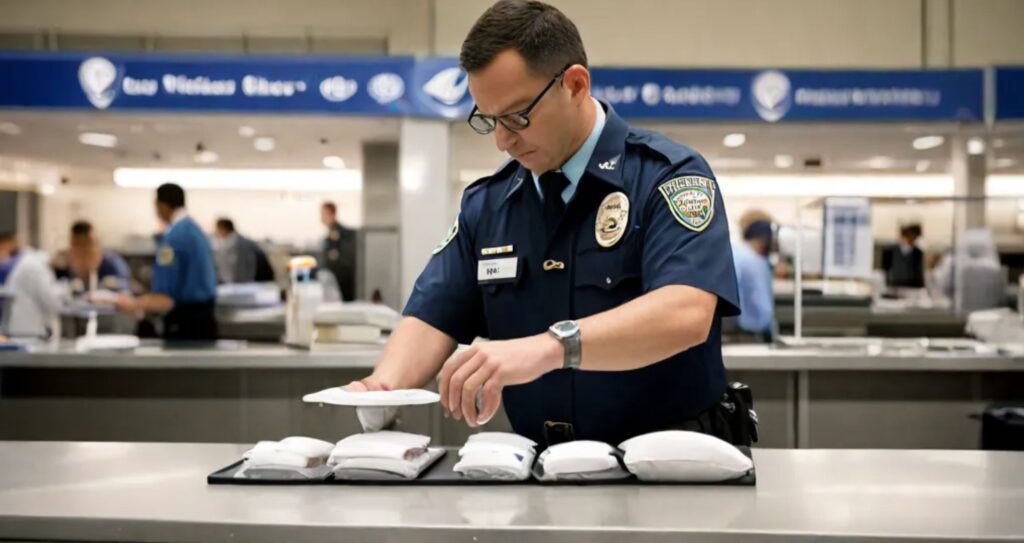Traveling can be exhilarating, but it often comes with worries about security checks. One common concern is whether the Transportation Security Administration TSA check for drugs. Moreover, As someone who has extensively researched this topic for “Wings Over Cloud“, I aim to provide you with a comprehensive understanding. Let’s delve into the specifics and answer some pressing questions.
Does TSA Check for Drugs?
The TSA’s primary focus is on ensuring the safety and security of passengers and aircraft. Their main objective is to detect and prevent threats like explosives and weapons from getting on board. However, the question remains: does TSA check for drugs?
TSA’s Official Stance on Drug Detection
The TSA is not specifically looking for drugs during their security screenings. Their primary tools, such as X-ray machines and advanced imaging technology, are designed to detect items that could pose a threat to aviation security. However, if TSA agents come across illegal substances during their checks, they are required to report them to law enforcement.
To ensure you understand the breadth of the TSA’s operations, let’s break down their processes:
- Primary Objective: The main goal is to ensure that no dangerous items, like explosives or weapons, are carried onto planes.
- Incidental Findings: While searching for these threats, TSA agents might find other items, such as drugs.
- Protocol: Upon finding suspected illegal substances, TSA agents will notify local law enforcement.
How Does TSA Check for Drugs?
While the TSA’s main focus isn’t on drug detection, its procedures and technology can incidentally uncover drugs. Here’s how:
Screening Processes
- Carry-On Bags: Your carry-on bags go through X-ray machines. Moreover, These machines are designed to detect suspicious items, and if drugs are discovered in the process, TSA agents will take appropriate action.
- Checked Luggage: Does TSA check for drugs in checked luggage? Yes, but not specifically. Checked bags are also scanned for security threats. If drugs are found, TSA will notify local authorities.
- Passenger Screening: Passengers go through metal detectors or full-body scanners. If something unusual is detected, you might be subject to additional screening.
Airport Body Scanners: The Ultimate Guide to Your Privacy & Security
Advanced Technology
- Advanced Imaging Technology (AIT): Basically, This is used for passenger screening, It can detect non-metallic threats, which might include drugs if they are on your person.
- Computed Tomography (CT): Used for checked luggage, it provides a detailed view of the contents, making it easier to identify suspicious items.
- Explosives Trace Detection (ETD): While primarily for detecting explosives, this technology can also pick up residues of illegal drugs.
Drug Detection Dogs
At some airports, you might see drug detection dogs. These dogs are trained to sniff out drugs and explosives. While they are more commonly used for explosive detection, they can alert their handlers to the presence of drugs as well.
Does TSA Check for Drugs in Checked Luggage?
You might wonder, does TSA check checked bags for drugs? The answer is that TSA screens all checked luggage for security threats. During this process, if drugs are detected, TSA will refer the matter to law enforcement. It’s important to note that their primary focus remains on security threats like explosives.
How Checked Luggage is Screened
- Initial Screening: All checked luggage goes through an x-ray machine. This machine can detect any suspicious items.
- Secondary Screening: If something suspicious is detected, the bag is flagged for further inspection. TSA agents will open the bag and inspect the contents manually.
- Reporting: If illegal drugs are found, the TSA will notify local law enforcement to handle the situation.
Types of Drugs TSA Might Encounter
While TSA isn’t looking for drugs, here are some substances they might find:
- Prescription Medications: Make sure these are properly labeled.
- Marijuana: Even if it’s legal in your state, it’s still illegal under federal law and could lead to complications.
- Illicit Drugs: Any illegal substances will lead to law enforcement being called.
Can Airport Scanners Detect Drugs? Uncover Hidden Truths Now!
How Long Does It Take for the TSA Drug Check?

Moreover, The duration of a TSA check for drugs check isn’t standard, as it’s not a primary focus of their screening process. However, if an item in your luggage raises suspicion, you could face additional screening, which might delay your travel plans.
Factors Affecting Screening Time
- Volume of Passengers: High traffic can slow down the process.
- Complexity of the Suspicion: Simple items might get cleared quickly, while more complex situations can take longer.
- Availability of Resources: The number of agents and availability of specialized equipment can impact wait times.
Tips to Speed Up the Process
- Pack Smart: Avoid packing items that might look suspicious under X-ray.
- Be Transparent: If you have items that might raise questions (like medical equipment), let TSA agents know ahead of time.
- Keep Documents Handy: Having your travel documents and any prescriptions ready can speed up the process.
Does TSA Check for Illegal Drugs?
Illegal drugs, if found, will certainly be reported. TSA agents are trained to look for potential threats, but if they stumble upon illegal drugs, they will notify the appropriate authorities. This is true for both carry-on and checked luggage.
Protocol for Handling Illegal Drugs
- Detection: During routine screening, if an agent finds something they suspect to be illegal drugs, they will inspect it further.
- Notification: TSA agents will call local law enforcement.
- Detainment: You may be detained until law enforcement arrives to assess the situation.
Potential Consequences
- Legal Action: Possession of illegal drugs can lead to arrest and prosecution.
- Travel Disruptions: You might miss your flight if detained for questioning.
- Permanent Record: A drug charge can have long-term effects on your travel privileges and legal record.
Does the TSA Check for Drugs on Private Planes?
Moreover, Does the TSA check for drugs on private planes? Yes, they do. While the screening process for private planes might differ slightly from commercial flights, the TSA still conducts thorough checks to ensure aviation security. This includes scanning for any potential threats, including illegal drugs.
Screening Process for Private Planes
- Fewer Passengers: This often means a more personalized and thorough screening process.
- Direct Interaction: TSA agents might have more direct interaction with passengers, leading to a more detailed inspection.
- Use of Technology: Similar technology is used to screen luggage and passengers on private planes as in commercial airports.
Additional Considerations
- Increased Scrutiny: Due to the personalized nature of private plane travel, there might be increased scrutiny of individual passengers.
- Collaboration with Local Authorities: TSA often works closely with local law enforcement at smaller airports.
What Happens if TSA Finds Drugs?

If TSA finds drugs in your luggage or on your person, here’s what you can expect:
- Notification: TSA will notify law enforcement immediately.
- Detainment: You may be detained for further questioning.
- Legal Consequences: Depending on the type and amount of drugs, you could face severe legal consequences, including arrest and prosecution.
Steps After Detection
- Initial Discovery: TSA agents will confirm their suspicion through further inspection.
- Law Enforcement Involvement: Law enforcement takes over, and TSA’s role ends at this point.
- Interrogation and Arrest: Depending on the substance and amount, you might be arrested.
Legal Implications
- State vs. Federal Law: Some substances legal in certain states (like marijuana) are still illegal federally and can lead to arrest.
- Severity of Charges: Moreover, Penalties vary based on the type and quantity of the drug found.
- Legal Representation: It’s advisable to seek legal representation immediately if you are detained.
How to Ensure a Smooth TSA Experience
To avoid any complications with the TSA, follow these guidelines:
- Know the Rules: Familiarize yourself with TSA guidelines on prohibited items.
- Pack Smart: Avoid carrying any substances that could be mistaken for drugs.
- Declare Medications: If you need to travel with prescription medications, keep them in their original containers and declare them to TSA agents if necessary.
Packing Tips
- Clear Containers: Use clear, labeled containers for medications.
- Separate Liquids: Follow the 3-1-1 rule for liquids to avoid unnecessary scrutiny.
- Avoid Edibles: Edible items that might look like drugs should be packed separately and declared if necessary.
General Travel Advice
- Arrive Early: Give yourself plenty of time for security screenings.
- Stay Calm: If you’re pulled aside for additional screening, stay calm and cooperate with TSA agents.
- Be Informed: Check the TSA website for the latest updates on prohibited items and screening procedures.
TSA check for drugs “Final Thoughts”

However, Traveling can be stressful, and concerns about TSA screenings can add to that stress. While the TSA’s primary focus is on ensuring passenger safety by detecting security threats, they do have the capability to find drugs during their screening processes. Moreover, It’s important to understand that if illegal substances are found, they will be reported to law enforcement, potentially leading to serious legal consequences.
By knowing what to expect and following TSA guidelines, you can ensure a smoother travel experience. Also Remember, the key to a stress-free journey is preparation and understanding the rules. Safe travels from all of us at “Wings Over Cloud“!
For more detailed articles on travel and aviation, visit our blog at Wings Over Cloud. If you have any questions or need further advice, don’t hesitate to reach out. We are here to make your flying experience as smooth as possible. Safe travels!

